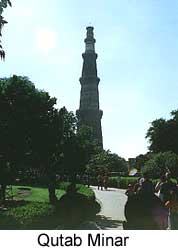

 |  |
 After the death of Mohammed Ghori in 1206, his general, Qutb-ud-din-Aibak, who was in-charge of his Indian possessions declared himself Sultan. But soon the Turks felt themselves insecure, since they feared the possibility of Rajput confederation against them, which strangely though never materialized. They were also afraid of their own divided loyalty. The ruler of Ghazni made no secret of his wish to annex the Punjab, a move which Qutb-ud-din-Aibak tried to thwart by moving his capital to Lahore, closer to Afghanistan than was Delhi. But the Turkish nobles at Delhi proved stronger than any other group, and on the death of Qutb-ud-din they selected his son-in-law Iltutmish as Sultan and the government moved to Delhi.
After the death of Mohammed Ghori in 1206, his general, Qutb-ud-din-Aibak, who was in-charge of his Indian possessions declared himself Sultan. But soon the Turks felt themselves insecure, since they feared the possibility of Rajput confederation against them, which strangely though never materialized. They were also afraid of their own divided loyalty. The ruler of Ghazni made no secret of his wish to annex the Punjab, a move which Qutb-ud-din-Aibak tried to thwart by moving his capital to Lahore, closer to Afghanistan than was Delhi. But the Turkish nobles at Delhi proved stronger than any other group, and on the death of Qutb-ud-din they selected his son-in-law Iltutmish as Sultan and the government moved to Delhi.Iltutmish realized that, if anything was to be saved of the Turkish possessions in India, he would have to strengthen the Sultanate and prevent the Turkish nobles from breaking away and founding independent principalities. By 1220 he had established the northern frontier of the Sultanate along the Indus river and had imposed his authority on the nobles. But by now the Rajputs had bestirred themselves and recovered the famous fort at Ranthambhor, which they had earlier lost to the Turks. Iltutmish began a campaign against the Rajputs, the first of many inconclusive campaigns which the Turks and the Rajputs were to fight. The northern frontier may have been secure against the Ghaznavids, but it was not respected by the Mongols, who had by now moved far from their homeland in central Asia. Through a series of raids between 1229 and 1241 they gained control of western Punjab, and Iltutmish was powerless to stop them. On the death of Iltutmish intrigue amongst the Turks increased, although there was a stable but brief interlude when his daughter Raziyya was on the throne. She was resented both for being a woman and for keeping the, control of the realm to herself, and was finally murdered. Court intrigue continued unabated until the emergence of Balban, who rose from minister to become Sultan in 1265 A.D. Balban did not found a dynasty. Anther group of Turks - the Khaljis - came to power in 1290 A.D. The Khaljis used their Afghan descent to win the loyalties of the discontented Afghan nobles, who felt that they had been neglected by the earlier Sultans. The Khaljis were also in favour of giving high office to Indian Muslims and to these extent reversed the policy of Balban. The aged Khalji Sultan had a ambitious nephew Alauddin Khalji, who had campaigned successfully in eastern India and the Deccan. In 1296 A.D. he attacked the city of Devanagri, still in the hands of the Yadavas. The Yadava king capitulated and payed a vast amount of gold to Alauddin Khalji as part of the treaty. Alauddin returned to the north, had the Sultan assassinated, and was proclaimed Sultan, having bought the novels with the Yadava gold. next page >> |
Copyright ©2000 indiansaga.info. All rights reserved.
By using this service, you accept that you won't copy or use the data given in this website for any commercial purpose.
The material on indiansaga.info is for informational & educational purpose only.
This site is best viewed at 800 X 600 picture resolution.